Human Resource Management Report: Atlas Logistic UK Ltd Analysis
VerifiedAdded on 2020/10/22
|12
|2779
|60
Report
AI Summary
This report delves into the core concepts of Human Resource Management (HRM) and Human Resource Development (HRD), highlighting their differences and the scope of HRD within an organization. It examines HRD's contribution to organizational productivity, emphasizing training, performance appraisal, and employee engagement. The report also explores the essential skills and ethical principles of effective HR professionals, addressing potential conflicts between line managers and HR professionals. Furthermore, it anticipates future changes impacting HRM, such as workplace structure, artificial intelligence, and workplace monitoring, and suggests strategies for adapting to these challenges. The report uses Atlas Logistic UK Ltd as a case study to illustrate the practical application of HRM principles.
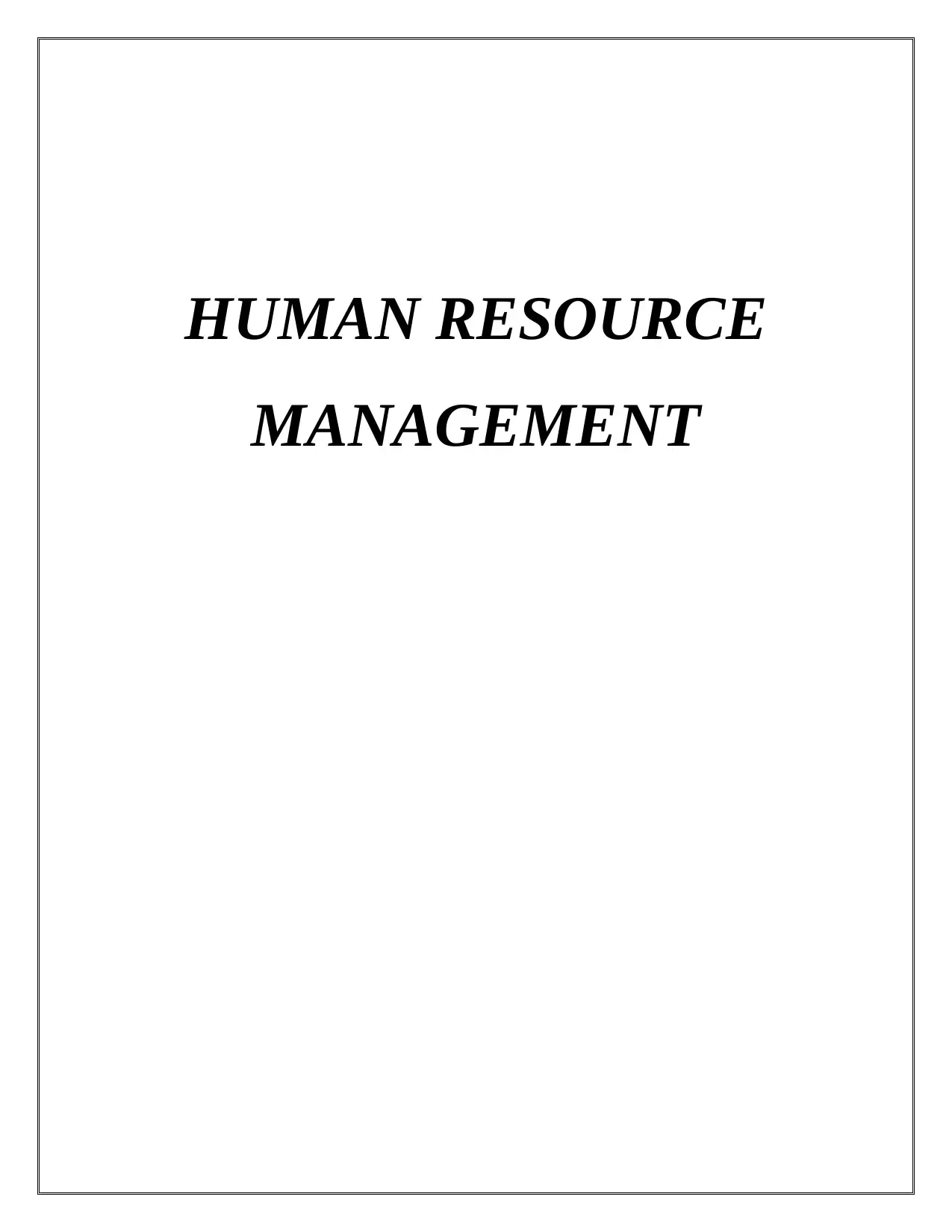
HUMAN RESOURCE
MANAGEMENT
MANAGEMENT
Paraphrase This Document
Need a fresh take? Get an instant paraphrase of this document with our AI Paraphraser
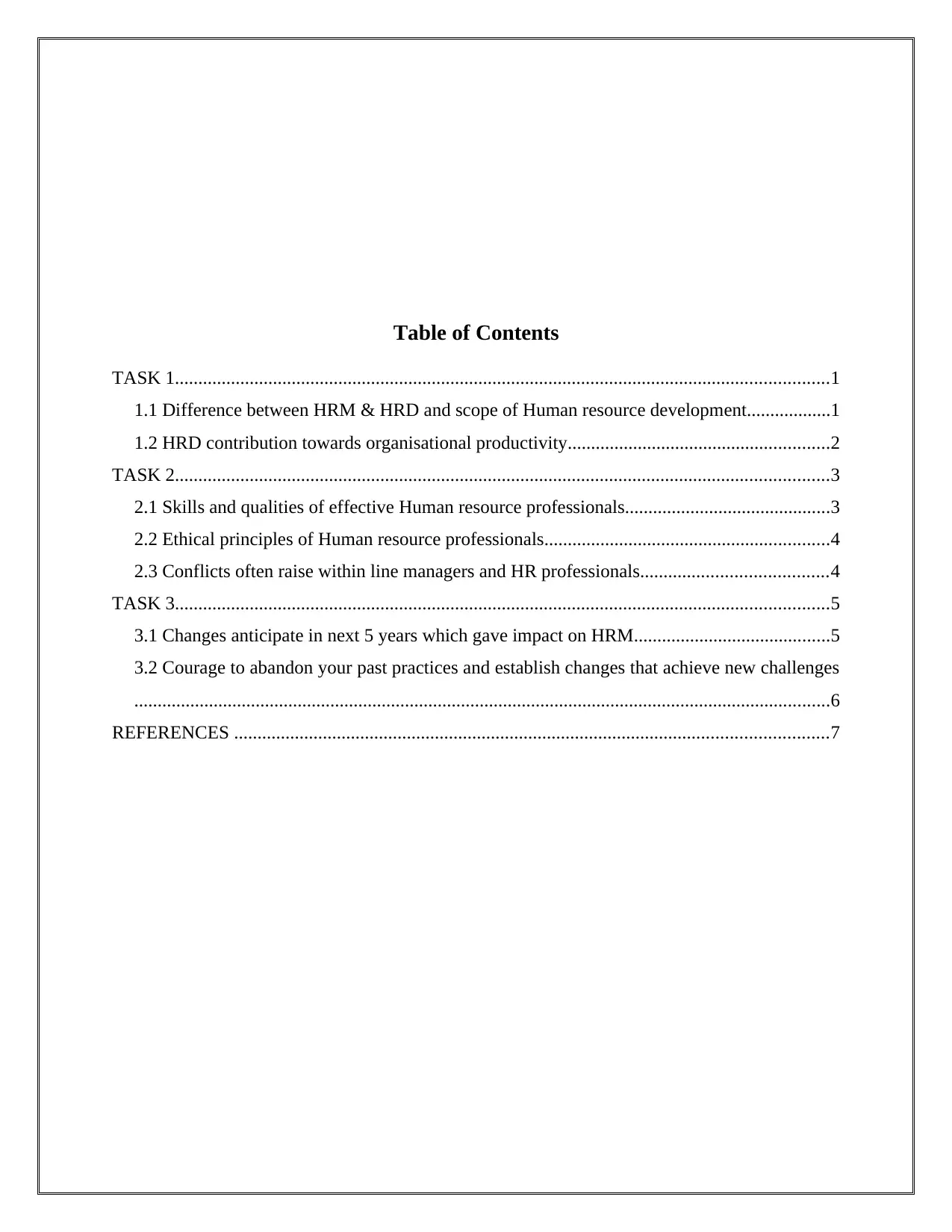
Table of Contents
TASK 1............................................................................................................................................1
1.1 Difference between HRM & HRD and scope of Human resource development..................1
1.2 HRD contribution towards organisational productivity........................................................2
TASK 2............................................................................................................................................3
2.1 Skills and qualities of effective Human resource professionals............................................3
2.2 Ethical principles of Human resource professionals.............................................................4
2.3 Conflicts often raise within line managers and HR professionals........................................4
TASK 3............................................................................................................................................5
3.1 Changes anticipate in next 5 years which gave impact on HRM..........................................5
3.2 Courage to abandon your past practices and establish changes that achieve new challenges
.....................................................................................................................................................6
REFERENCES ...............................................................................................................................7
TASK 1............................................................................................................................................1
1.1 Difference between HRM & HRD and scope of Human resource development..................1
1.2 HRD contribution towards organisational productivity........................................................2
TASK 2............................................................................................................................................3
2.1 Skills and qualities of effective Human resource professionals............................................3
2.2 Ethical principles of Human resource professionals.............................................................4
2.3 Conflicts often raise within line managers and HR professionals........................................4
TASK 3............................................................................................................................................5
3.1 Changes anticipate in next 5 years which gave impact on HRM..........................................5
3.2 Courage to abandon your past practices and establish changes that achieve new challenges
.....................................................................................................................................................6
REFERENCES ...............................................................................................................................7
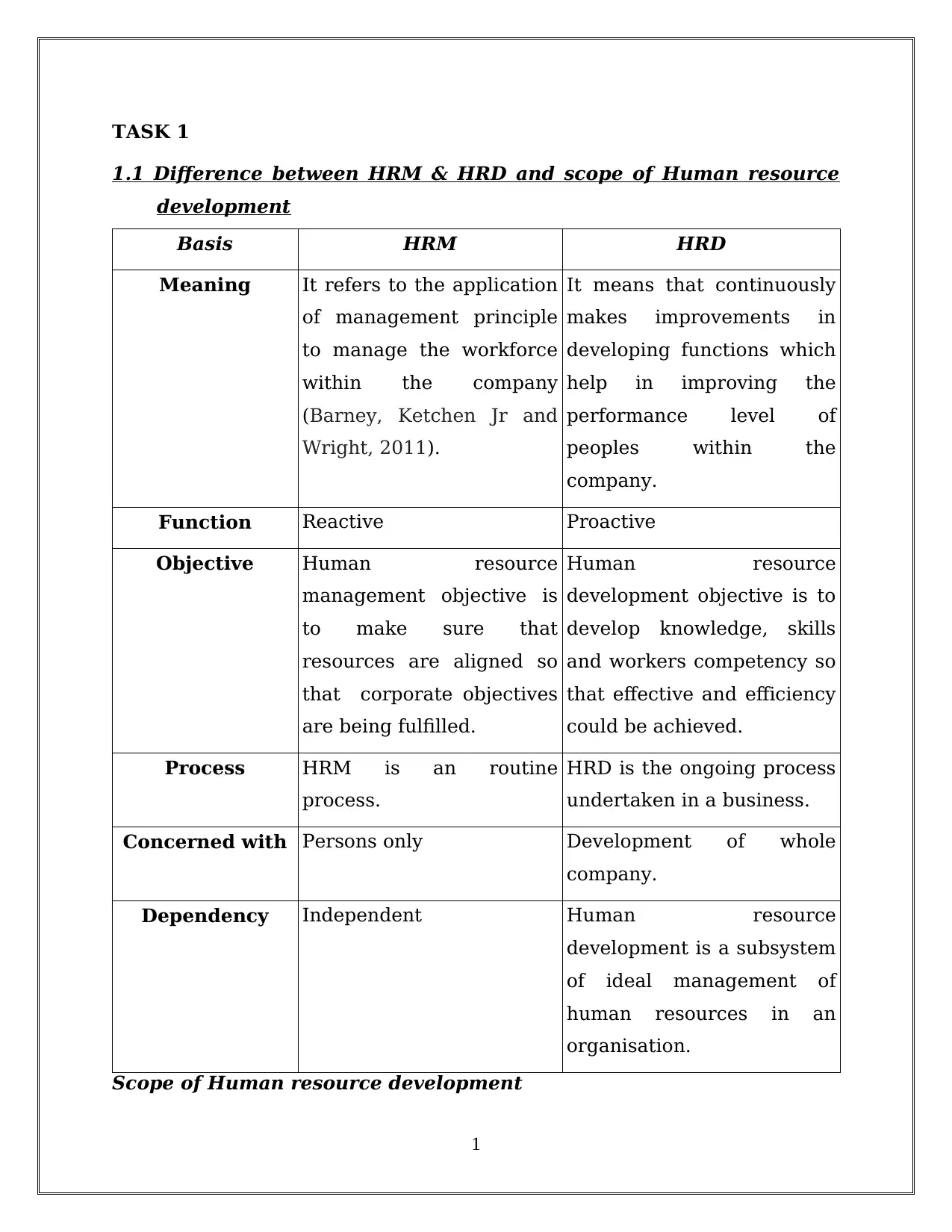
TASK 1
1.1 Difference between HRM & HRD and scope of Human resource
development
Basis HRM HRD
Meaning It refers to the application
of management principle
to manage the workforce
within the company
(Barney, Ketchen Jr and
Wright, 2011).
It means that continuously
makes improvements in
developing functions which
help in improving the
performance level of
peoples within the
company.
Function Reactive Proactive
Objective Human resource
management objective is
to make sure that
resources are aligned so
that corporate objectives
are being fulfilled.
Human resource
development objective is to
develop knowledge, skills
and workers competency so
that effective and efficiency
could be achieved.
Process HRM is an routine
process.
HRD is the ongoing process
undertaken in a business.
Concerned with Persons only Development of whole
company.
Dependency Independent Human resource
development is a subsystem
of ideal management of
human resources in an
organisation.
Scope of Human resource development
1
1.1 Difference between HRM & HRD and scope of Human resource
development
Basis HRM HRD
Meaning It refers to the application
of management principle
to manage the workforce
within the company
(Barney, Ketchen Jr and
Wright, 2011).
It means that continuously
makes improvements in
developing functions which
help in improving the
performance level of
peoples within the
company.
Function Reactive Proactive
Objective Human resource
management objective is
to make sure that
resources are aligned so
that corporate objectives
are being fulfilled.
Human resource
development objective is to
develop knowledge, skills
and workers competency so
that effective and efficiency
could be achieved.
Process HRM is an routine
process.
HRD is the ongoing process
undertaken in a business.
Concerned with Persons only Development of whole
company.
Dependency Independent Human resource
development is a subsystem
of ideal management of
human resources in an
organisation.
Scope of Human resource development
1
⊘ This is a preview!⊘
Do you want full access?
Subscribe today to unlock all pages.

Trusted by 1+ million students worldwide
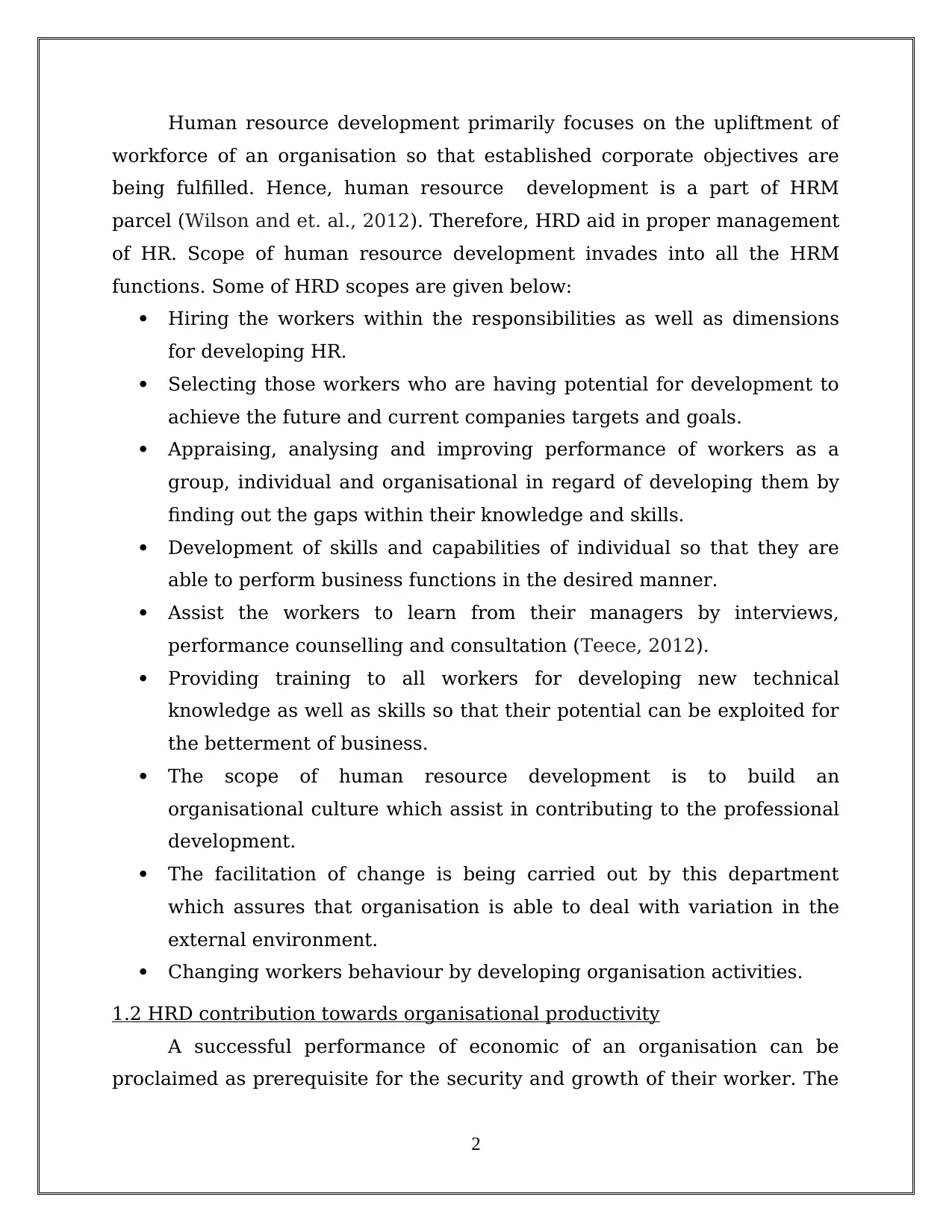
Human resource development primarily focuses on the upliftment of
workforce of an organisation so that established corporate objectives are
being fulfilled. Hence, human resource development is a part of HRM
parcel (Wilson and et. al., 2012). Therefore, HRD aid in proper management
of HR. Scope of human resource development invades into all the HRM
functions. Some of HRD scopes are given below:
Hiring the workers within the responsibilities as well as dimensions
for developing HR.
Selecting those workers who are having potential for development to
achieve the future and current companies targets and goals.
Appraising, analysing and improving performance of workers as a
group, individual and organisational in regard of developing them by
finding out the gaps within their knowledge and skills.
Development of skills and capabilities of individual so that they are
able to perform business functions in the desired manner.
Assist the workers to learn from their managers by interviews,
performance counselling and consultation (Teece, 2012).
Providing training to all workers for developing new technical
knowledge as well as skills so that their potential can be exploited for
the betterment of business.
The scope of human resource development is to build an
organisational culture which assist in contributing to the professional
development.
The facilitation of change is being carried out by this department
which assures that organisation is able to deal with variation in the
external environment.
Changing workers behaviour by developing organisation activities.
1.2 HRD contribution towards organisational productivity
A successful performance of economic of an organisation can be
proclaimed as prerequisite for the security and growth of their worker. The
2
workforce of an organisation so that established corporate objectives are
being fulfilled. Hence, human resource development is a part of HRM
parcel (Wilson and et. al., 2012). Therefore, HRD aid in proper management
of HR. Scope of human resource development invades into all the HRM
functions. Some of HRD scopes are given below:
Hiring the workers within the responsibilities as well as dimensions
for developing HR.
Selecting those workers who are having potential for development to
achieve the future and current companies targets and goals.
Appraising, analysing and improving performance of workers as a
group, individual and organisational in regard of developing them by
finding out the gaps within their knowledge and skills.
Development of skills and capabilities of individual so that they are
able to perform business functions in the desired manner.
Assist the workers to learn from their managers by interviews,
performance counselling and consultation (Teece, 2012).
Providing training to all workers for developing new technical
knowledge as well as skills so that their potential can be exploited for
the betterment of business.
The scope of human resource development is to build an
organisational culture which assist in contributing to the professional
development.
The facilitation of change is being carried out by this department
which assures that organisation is able to deal with variation in the
external environment.
Changing workers behaviour by developing organisation activities.
1.2 HRD contribution towards organisational productivity
A successful performance of economic of an organisation can be
proclaimed as prerequisite for the security and growth of their worker. The
2
Paraphrase This Document
Need a fresh take? Get an instant paraphrase of this document with our AI Paraphraser
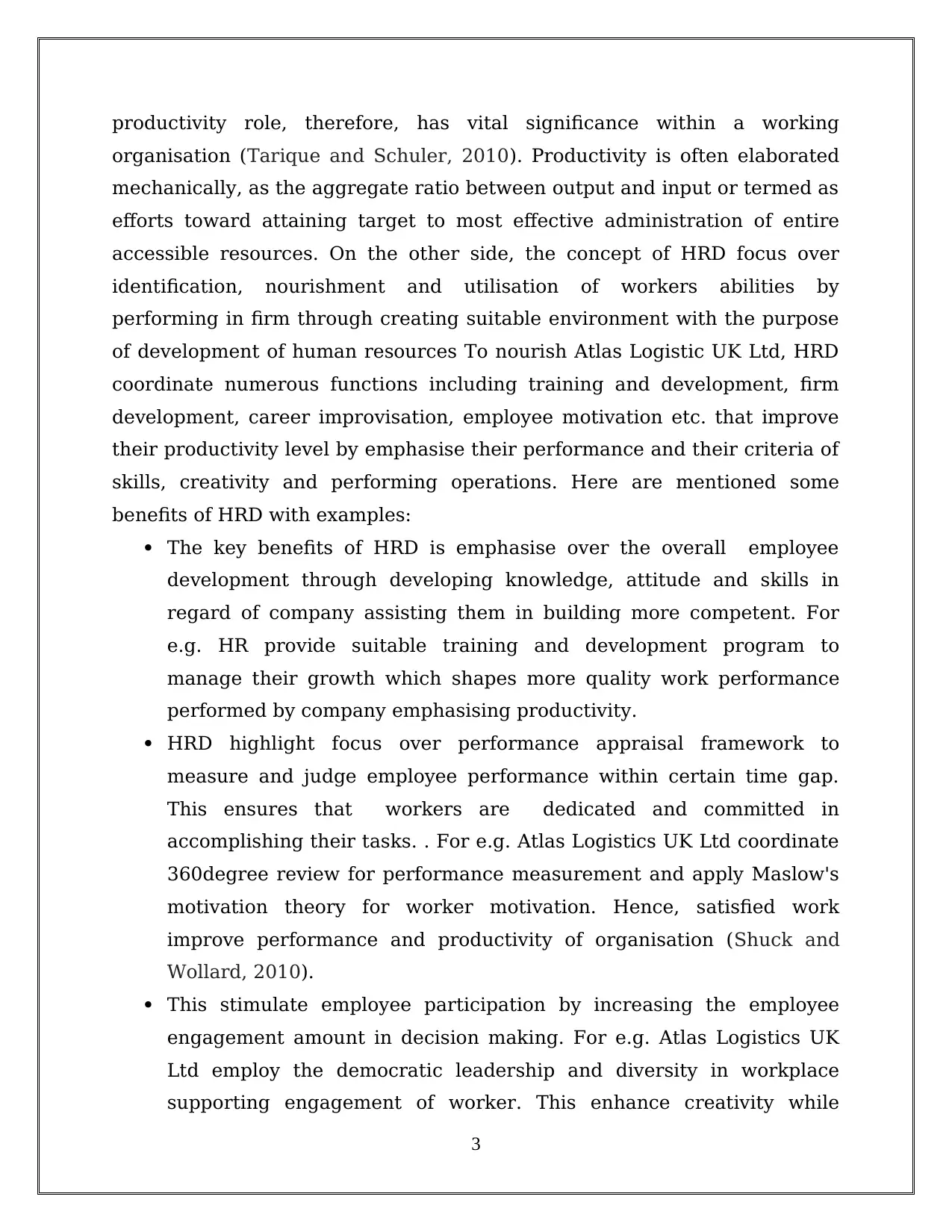
productivity role, therefore, has vital significance within a working
organisation (Tarique and Schuler, 2010). Productivity is often elaborated
mechanically, as the aggregate ratio between output and input or termed as
efforts toward attaining target to most effective administration of entire
accessible resources. On the other side, the concept of HRD focus over
identification, nourishment and utilisation of workers abilities by
performing in firm through creating suitable environment with the purpose
of development of human resources To nourish Atlas Logistic UK Ltd, HRD
coordinate numerous functions including training and development, firm
development, career improvisation, employee motivation etc. that improve
their productivity level by emphasise their performance and their criteria of
skills, creativity and performing operations. Here are mentioned some
benefits of HRD with examples:
The key benefits of HRD is emphasise over the overall employee
development through developing knowledge, attitude and skills in
regard of company assisting them in building more competent. For
e.g. HR provide suitable training and development program to
manage their growth which shapes more quality work performance
performed by company emphasising productivity.
HRD highlight focus over performance appraisal framework to
measure and judge employee performance within certain time gap.
This ensures that workers are dedicated and committed in
accomplishing their tasks. . For e.g. Atlas Logistics UK Ltd coordinate
360degree review for performance measurement and apply Maslow's
motivation theory for worker motivation. Hence, satisfied work
improve performance and productivity of organisation (Shuck and
Wollard, 2010).
This stimulate employee participation by increasing the employee
engagement amount in decision making. For e.g. Atlas Logistics UK
Ltd employ the democratic leadership and diversity in workplace
supporting engagement of worker. This enhance creativity while
3
organisation (Tarique and Schuler, 2010). Productivity is often elaborated
mechanically, as the aggregate ratio between output and input or termed as
efforts toward attaining target to most effective administration of entire
accessible resources. On the other side, the concept of HRD focus over
identification, nourishment and utilisation of workers abilities by
performing in firm through creating suitable environment with the purpose
of development of human resources To nourish Atlas Logistic UK Ltd, HRD
coordinate numerous functions including training and development, firm
development, career improvisation, employee motivation etc. that improve
their productivity level by emphasise their performance and their criteria of
skills, creativity and performing operations. Here are mentioned some
benefits of HRD with examples:
The key benefits of HRD is emphasise over the overall employee
development through developing knowledge, attitude and skills in
regard of company assisting them in building more competent. For
e.g. HR provide suitable training and development program to
manage their growth which shapes more quality work performance
performed by company emphasising productivity.
HRD highlight focus over performance appraisal framework to
measure and judge employee performance within certain time gap.
This ensures that workers are dedicated and committed in
accomplishing their tasks. . For e.g. Atlas Logistics UK Ltd coordinate
360degree review for performance measurement and apply Maslow's
motivation theory for worker motivation. Hence, satisfied work
improve performance and productivity of organisation (Shuck and
Wollard, 2010).
This stimulate employee participation by increasing the employee
engagement amount in decision making. For e.g. Atlas Logistics UK
Ltd employ the democratic leadership and diversity in workplace
supporting engagement of worker. This enhance creativity while
3
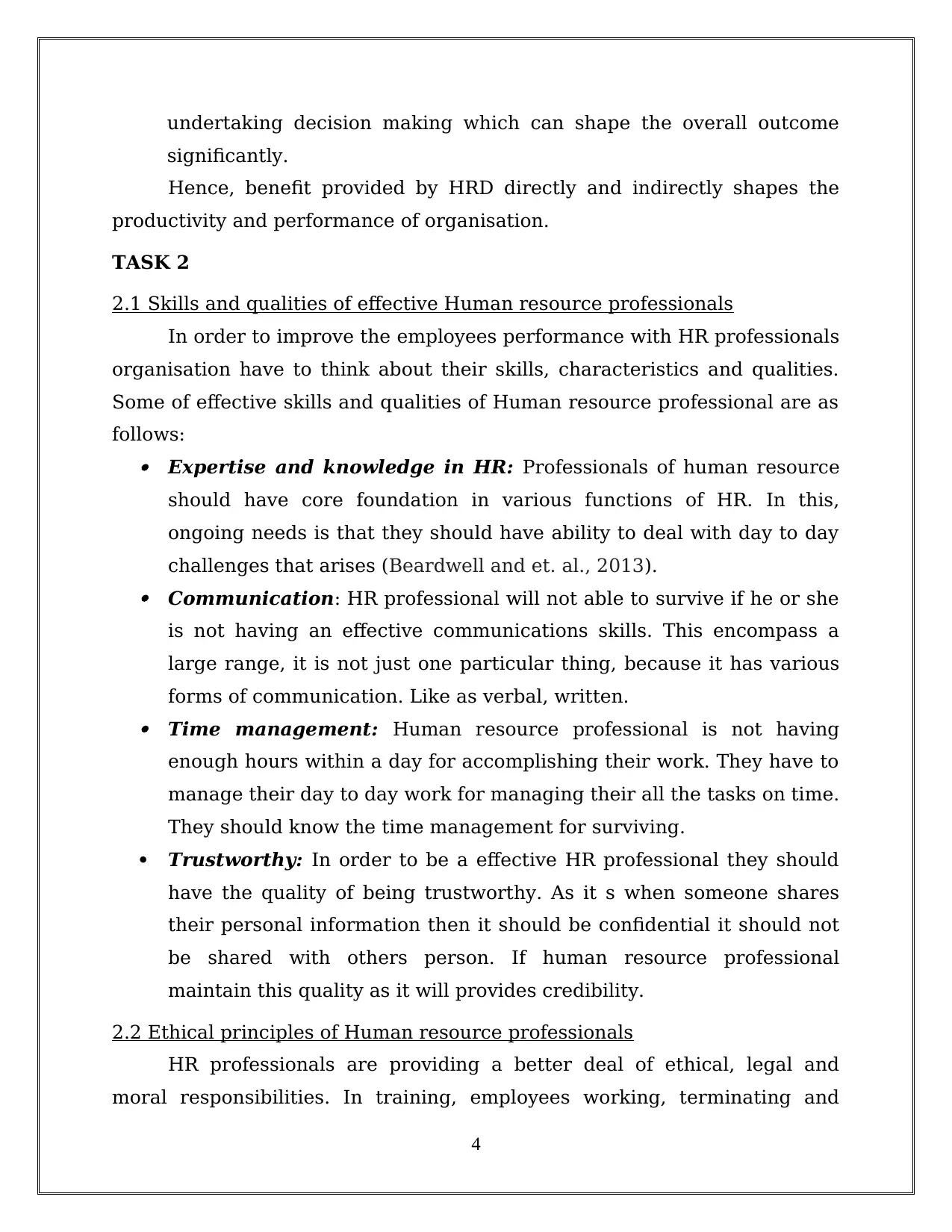
undertaking decision making which can shape the overall outcome
significantly.
Hence, benefit provided by HRD directly and indirectly shapes the
productivity and performance of organisation.
TASK 2
2.1 Skills and qualities of effective Human resource professionals
In order to improve the employees performance with HR professionals
organisation have to think about their skills, characteristics and qualities.
Some of effective skills and qualities of Human resource professional are as
follows: Expertise and knowledge in HR: Professionals of human resource
should have core foundation in various functions of HR. In this,
ongoing needs is that they should have ability to deal with day to day
challenges that arises (Beardwell and et. al., 2013). Communication: HR professional will not able to survive if he or she
is not having an effective communications skills. This encompass a
large range, it is not just one particular thing, because it has various
forms of communication. Like as verbal, written. Time management: Human resource professional is not having
enough hours within a day for accomplishing their work. They have to
manage their day to day work for managing their all the tasks on time.
They should know the time management for surviving.
Trustworthy: In order to be a effective HR professional they should
have the quality of being trustworthy. As it s when someone shares
their personal information then it should be confidential it should not
be shared with others person. If human resource professional
maintain this quality as it will provides credibility.
2.2 Ethical principles of Human resource professionals
HR professionals are providing a better deal of ethical, legal and
moral responsibilities. In training, employees working, terminating and
4
significantly.
Hence, benefit provided by HRD directly and indirectly shapes the
productivity and performance of organisation.
TASK 2
2.1 Skills and qualities of effective Human resource professionals
In order to improve the employees performance with HR professionals
organisation have to think about their skills, characteristics and qualities.
Some of effective skills and qualities of Human resource professional are as
follows: Expertise and knowledge in HR: Professionals of human resource
should have core foundation in various functions of HR. In this,
ongoing needs is that they should have ability to deal with day to day
challenges that arises (Beardwell and et. al., 2013). Communication: HR professional will not able to survive if he or she
is not having an effective communications skills. This encompass a
large range, it is not just one particular thing, because it has various
forms of communication. Like as verbal, written. Time management: Human resource professional is not having
enough hours within a day for accomplishing their work. They have to
manage their day to day work for managing their all the tasks on time.
They should know the time management for surviving.
Trustworthy: In order to be a effective HR professional they should
have the quality of being trustworthy. As it s when someone shares
their personal information then it should be confidential it should not
be shared with others person. If human resource professional
maintain this quality as it will provides credibility.
2.2 Ethical principles of Human resource professionals
HR professionals are providing a better deal of ethical, legal and
moral responsibilities. In training, employees working, terminating and
4
⊘ This is a preview!⊘
Do you want full access?
Subscribe today to unlock all pages.

Trusted by 1+ million students worldwide
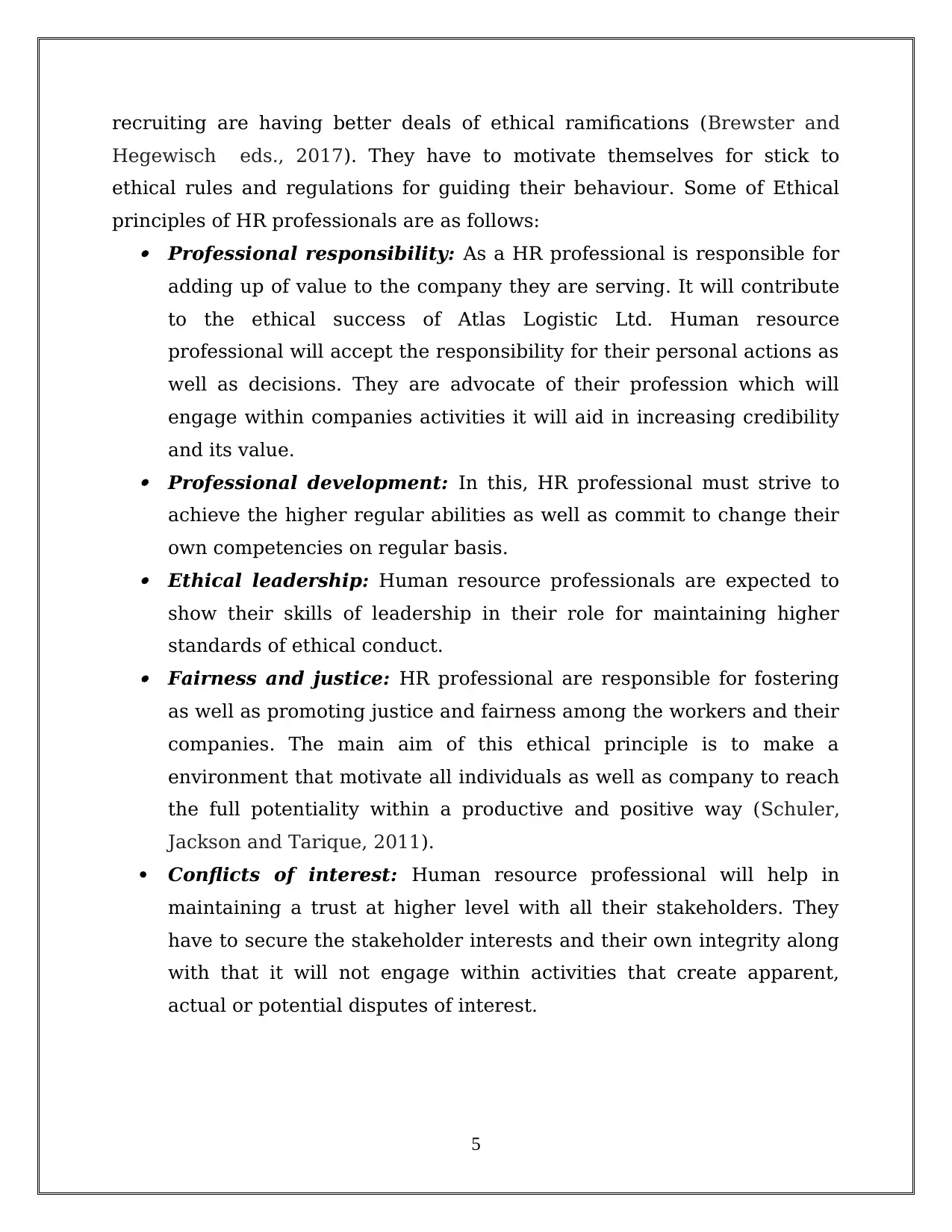
recruiting are having better deals of ethical ramifications (Brewster and
Hegewisch eds., 2017). They have to motivate themselves for stick to
ethical rules and regulations for guiding their behaviour. Some of Ethical
principles of HR professionals are as follows: Professional responsibility: As a HR professional is responsible for
adding up of value to the company they are serving. It will contribute
to the ethical success of Atlas Logistic Ltd. Human resource
professional will accept the responsibility for their personal actions as
well as decisions. They are advocate of their profession which will
engage within companies activities it will aid in increasing credibility
and its value. Professional development: In this, HR professional must strive to
achieve the higher regular abilities as well as commit to change their
own competencies on regular basis. Ethical leadership: Human resource professionals are expected to
show their skills of leadership in their role for maintaining higher
standards of ethical conduct. Fairness and justice: HR professional are responsible for fostering
as well as promoting justice and fairness among the workers and their
companies. The main aim of this ethical principle is to make a
environment that motivate all individuals as well as company to reach
the full potentiality within a productive and positive way (Schuler,
Jackson and Tarique, 2011).
Conflicts of interest: Human resource professional will help in
maintaining a trust at higher level with all their stakeholders. They
have to secure the stakeholder interests and their own integrity along
with that it will not engage within activities that create apparent,
actual or potential disputes of interest.
5
Hegewisch eds., 2017). They have to motivate themselves for stick to
ethical rules and regulations for guiding their behaviour. Some of Ethical
principles of HR professionals are as follows: Professional responsibility: As a HR professional is responsible for
adding up of value to the company they are serving. It will contribute
to the ethical success of Atlas Logistic Ltd. Human resource
professional will accept the responsibility for their personal actions as
well as decisions. They are advocate of their profession which will
engage within companies activities it will aid in increasing credibility
and its value. Professional development: In this, HR professional must strive to
achieve the higher regular abilities as well as commit to change their
own competencies on regular basis. Ethical leadership: Human resource professionals are expected to
show their skills of leadership in their role for maintaining higher
standards of ethical conduct. Fairness and justice: HR professional are responsible for fostering
as well as promoting justice and fairness among the workers and their
companies. The main aim of this ethical principle is to make a
environment that motivate all individuals as well as company to reach
the full potentiality within a productive and positive way (Schuler,
Jackson and Tarique, 2011).
Conflicts of interest: Human resource professional will help in
maintaining a trust at higher level with all their stakeholders. They
have to secure the stakeholder interests and their own integrity along
with that it will not engage within activities that create apparent,
actual or potential disputes of interest.
5
Paraphrase This Document
Need a fresh take? Get an instant paraphrase of this document with our AI Paraphraser
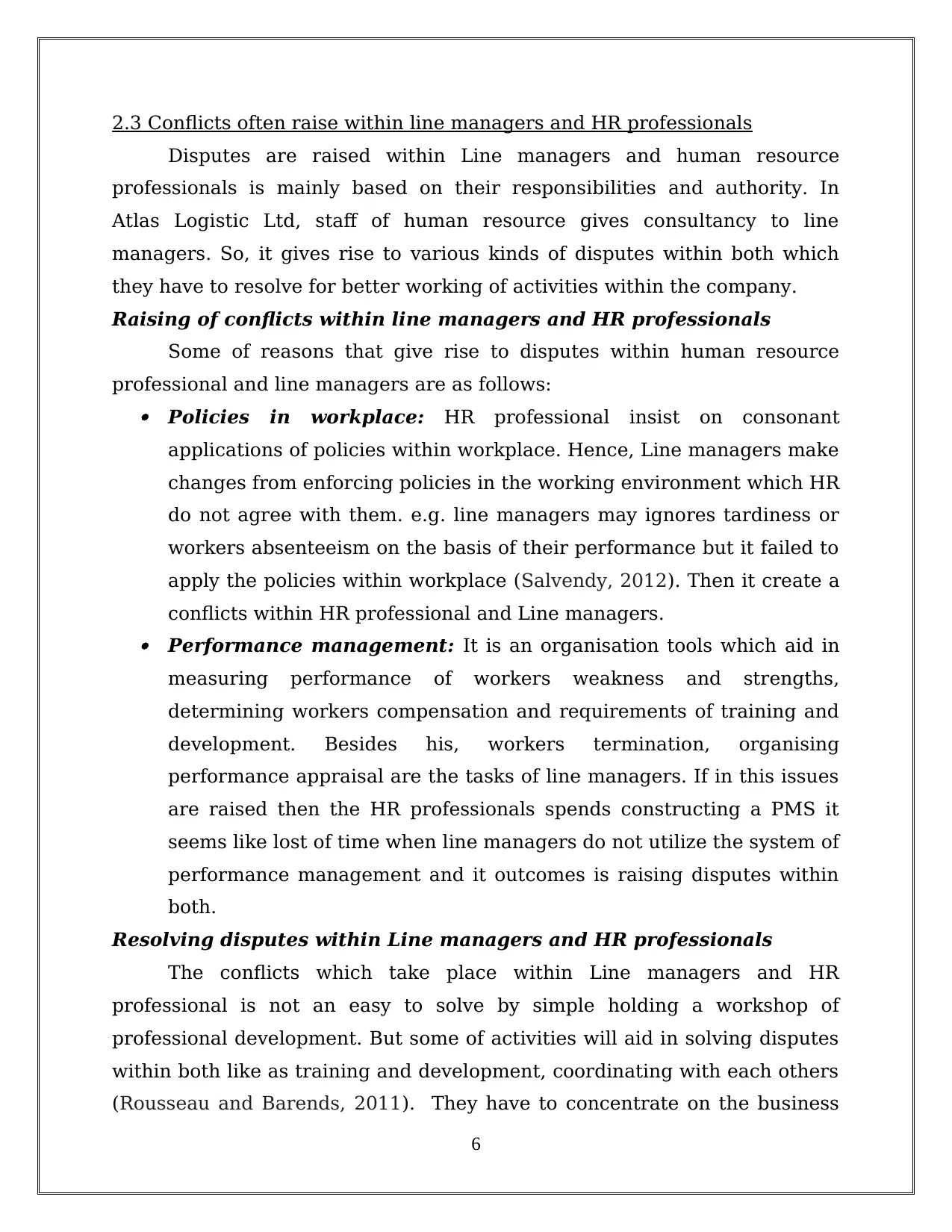
2.3 Conflicts often raise within line managers and HR professionals
Disputes are raised within Line managers and human resource
professionals is mainly based on their responsibilities and authority. In
Atlas Logistic Ltd, staff of human resource gives consultancy to line
managers. So, it gives rise to various kinds of disputes within both which
they have to resolve for better working of activities within the company.
Raising of conflicts within line managers and HR professionals
Some of reasons that give rise to disputes within human resource
professional and line managers are as follows: Policies in workplace: HR professional insist on consonant
applications of policies within workplace. Hence, Line managers make
changes from enforcing policies in the working environment which HR
do not agree with them. e.g. line managers may ignores tardiness or
workers absenteeism on the basis of their performance but it failed to
apply the policies within workplace (Salvendy, 2012). Then it create a
conflicts within HR professional and Line managers. Performance management: It is an organisation tools which aid in
measuring performance of workers weakness and strengths,
determining workers compensation and requirements of training and
development. Besides his, workers termination, organising
performance appraisal are the tasks of line managers. If in this issues
are raised then the HR professionals spends constructing a PMS it
seems like lost of time when line managers do not utilize the system of
performance management and it outcomes is raising disputes within
both.
Resolving disputes within Line managers and HR professionals
The conflicts which take place within Line managers and HR
professional is not an easy to solve by simple holding a workshop of
professional development. But some of activities will aid in solving disputes
within both like as training and development, coordinating with each others
(Rousseau and Barends, 2011). They have to concentrate on the business
6
Disputes are raised within Line managers and human resource
professionals is mainly based on their responsibilities and authority. In
Atlas Logistic Ltd, staff of human resource gives consultancy to line
managers. So, it gives rise to various kinds of disputes within both which
they have to resolve for better working of activities within the company.
Raising of conflicts within line managers and HR professionals
Some of reasons that give rise to disputes within human resource
professional and line managers are as follows: Policies in workplace: HR professional insist on consonant
applications of policies within workplace. Hence, Line managers make
changes from enforcing policies in the working environment which HR
do not agree with them. e.g. line managers may ignores tardiness or
workers absenteeism on the basis of their performance but it failed to
apply the policies within workplace (Salvendy, 2012). Then it create a
conflicts within HR professional and Line managers. Performance management: It is an organisation tools which aid in
measuring performance of workers weakness and strengths,
determining workers compensation and requirements of training and
development. Besides his, workers termination, organising
performance appraisal are the tasks of line managers. If in this issues
are raised then the HR professionals spends constructing a PMS it
seems like lost of time when line managers do not utilize the system of
performance management and it outcomes is raising disputes within
both.
Resolving disputes within Line managers and HR professionals
The conflicts which take place within Line managers and HR
professional is not an easy to solve by simple holding a workshop of
professional development. But some of activities will aid in solving disputes
within both like as training and development, coordinating with each others
(Rousseau and Barends, 2011). They have to concentrate on the business
6
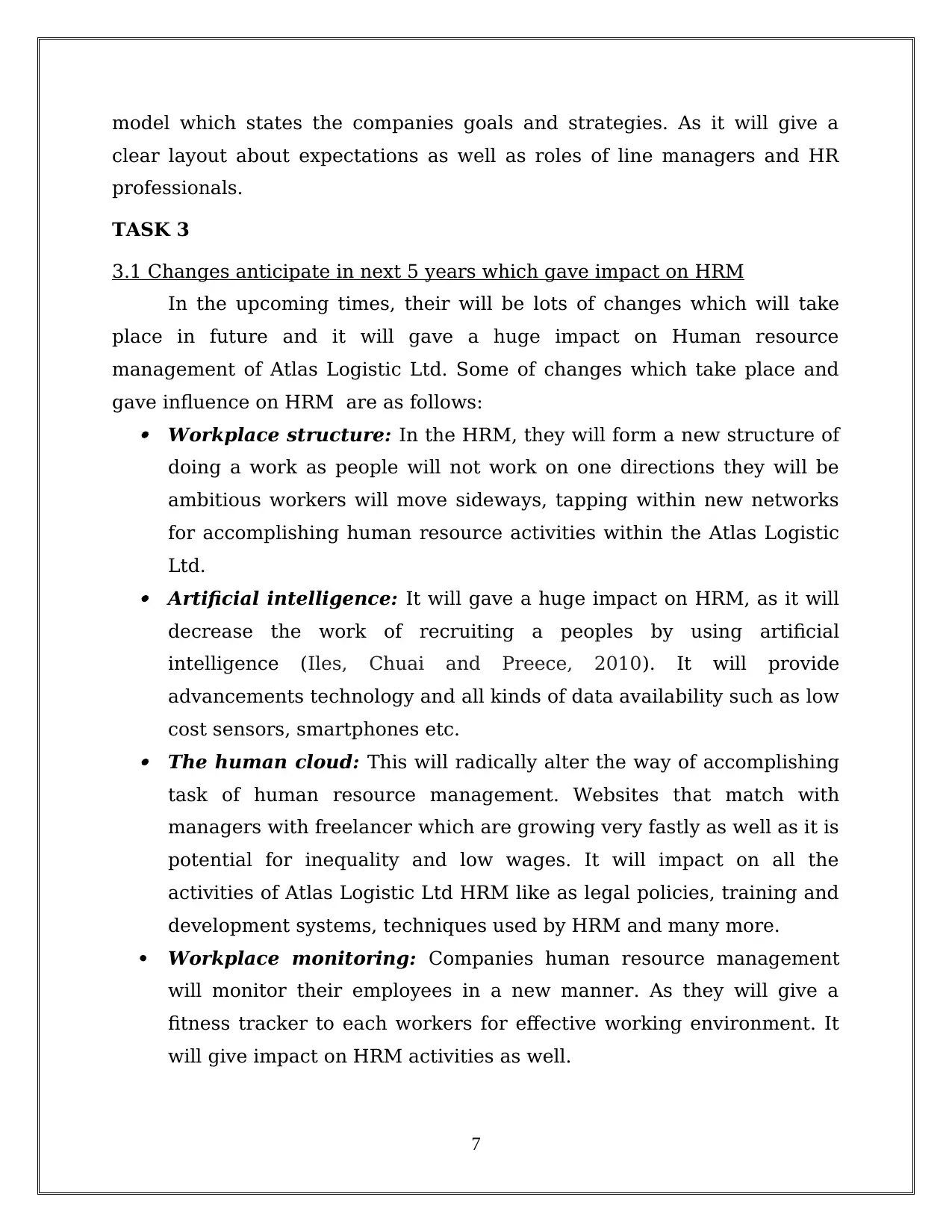
model which states the companies goals and strategies. As it will give a
clear layout about expectations as well as roles of line managers and HR
professionals.
TASK 3
3.1 Changes anticipate in next 5 years which gave impact on HRM
In the upcoming times, their will be lots of changes which will take
place in future and it will gave a huge impact on Human resource
management of Atlas Logistic Ltd. Some of changes which take place and
gave influence on HRM are as follows: Workplace structure: In the HRM, they will form a new structure of
doing a work as people will not work on one directions they will be
ambitious workers will move sideways, tapping within new networks
for accomplishing human resource activities within the Atlas Logistic
Ltd. Artificial intelligence: It will gave a huge impact on HRM, as it will
decrease the work of recruiting a peoples by using artificial
intelligence (Iles, Chuai and Preece, 2010). It will provide
advancements technology and all kinds of data availability such as low
cost sensors, smartphones etc. The human cloud: This will radically alter the way of accomplishing
task of human resource management. Websites that match with
managers with freelancer which are growing very fastly as well as it is
potential for inequality and low wages. It will impact on all the
activities of Atlas Logistic Ltd HRM like as legal policies, training and
development systems, techniques used by HRM and many more.
Workplace monitoring: Companies human resource management
will monitor their employees in a new manner. As they will give a
fitness tracker to each workers for effective working environment. It
will give impact on HRM activities as well.
7
clear layout about expectations as well as roles of line managers and HR
professionals.
TASK 3
3.1 Changes anticipate in next 5 years which gave impact on HRM
In the upcoming times, their will be lots of changes which will take
place in future and it will gave a huge impact on Human resource
management of Atlas Logistic Ltd. Some of changes which take place and
gave influence on HRM are as follows: Workplace structure: In the HRM, they will form a new structure of
doing a work as people will not work on one directions they will be
ambitious workers will move sideways, tapping within new networks
for accomplishing human resource activities within the Atlas Logistic
Ltd. Artificial intelligence: It will gave a huge impact on HRM, as it will
decrease the work of recruiting a peoples by using artificial
intelligence (Iles, Chuai and Preece, 2010). It will provide
advancements technology and all kinds of data availability such as low
cost sensors, smartphones etc. The human cloud: This will radically alter the way of accomplishing
task of human resource management. Websites that match with
managers with freelancer which are growing very fastly as well as it is
potential for inequality and low wages. It will impact on all the
activities of Atlas Logistic Ltd HRM like as legal policies, training and
development systems, techniques used by HRM and many more.
Workplace monitoring: Companies human resource management
will monitor their employees in a new manner. As they will give a
fitness tracker to each workers for effective working environment. It
will give impact on HRM activities as well.
7
⊘ This is a preview!⊘
Do you want full access?
Subscribe today to unlock all pages.

Trusted by 1+ million students worldwide
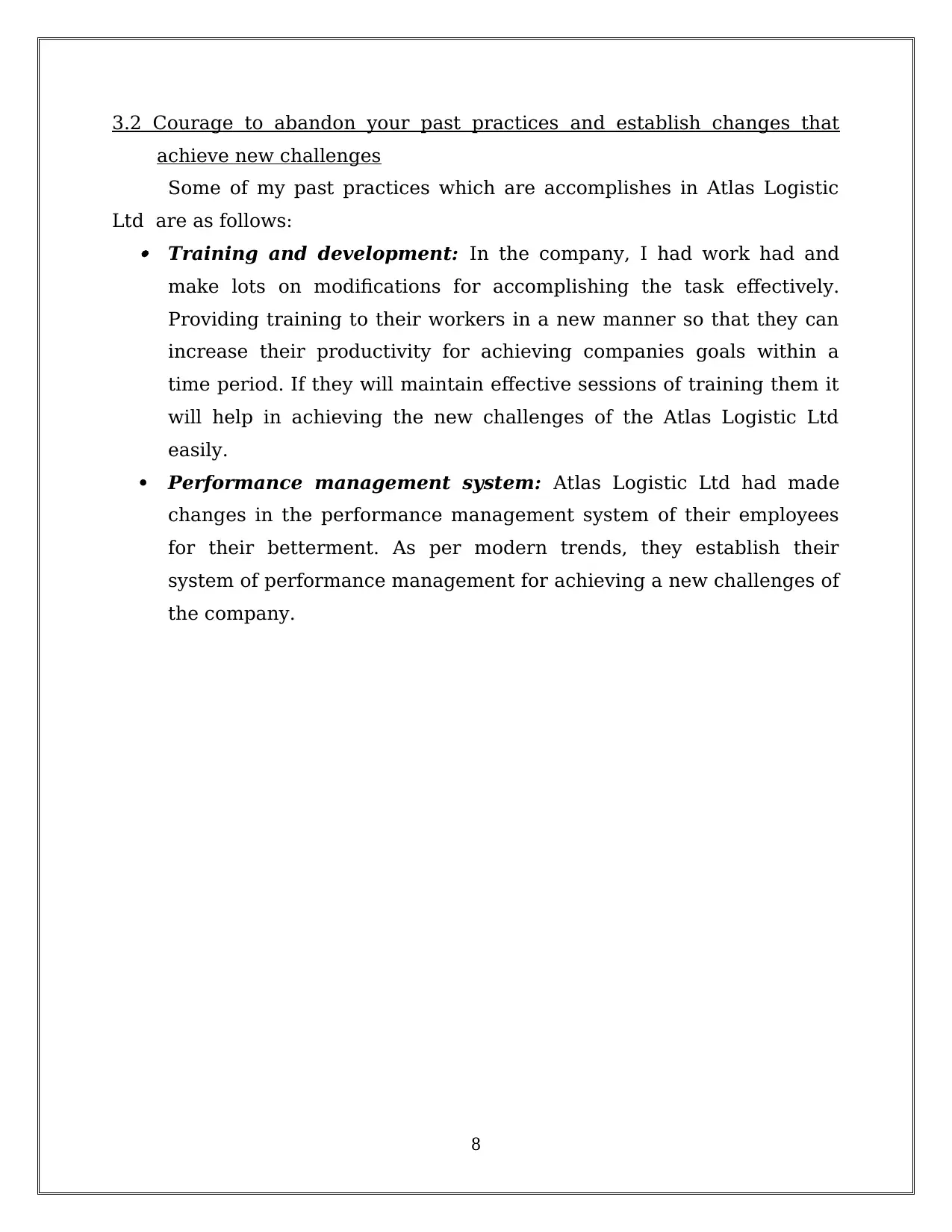
3.2 Courage to abandon your past practices and establish changes that
achieve new challenges
Some of my past practices which are accomplishes in Atlas Logistic
Ltd are as follows: Training and development: In the company, I had work had and
make lots on modifications for accomplishing the task effectively.
Providing training to their workers in a new manner so that they can
increase their productivity for achieving companies goals within a
time period. If they will maintain effective sessions of training them it
will help in achieving the new challenges of the Atlas Logistic Ltd
easily.
Performance management system: Atlas Logistic Ltd had made
changes in the performance management system of their employees
for their betterment. As per modern trends, they establish their
system of performance management for achieving a new challenges of
the company.
8
achieve new challenges
Some of my past practices which are accomplishes in Atlas Logistic
Ltd are as follows: Training and development: In the company, I had work had and
make lots on modifications for accomplishing the task effectively.
Providing training to their workers in a new manner so that they can
increase their productivity for achieving companies goals within a
time period. If they will maintain effective sessions of training them it
will help in achieving the new challenges of the Atlas Logistic Ltd
easily.
Performance management system: Atlas Logistic Ltd had made
changes in the performance management system of their employees
for their betterment. As per modern trends, they establish their
system of performance management for achieving a new challenges of
the company.
8
Paraphrase This Document
Need a fresh take? Get an instant paraphrase of this document with our AI Paraphraser
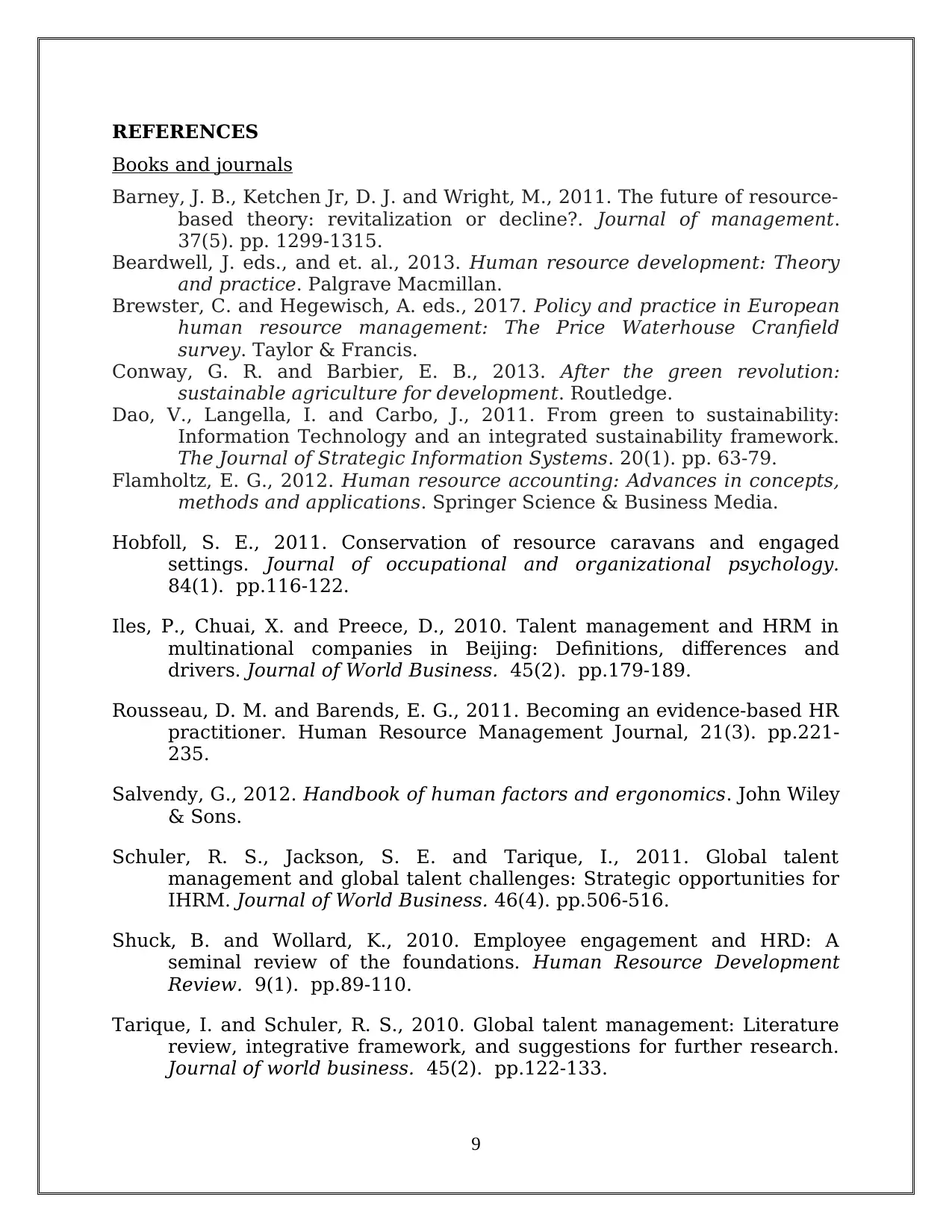
REFERENCES
Books and journals
Barney, J. B., Ketchen Jr, D. J. and Wright, M., 2011. The future of resource-
based theory: revitalization or decline?. Journal of management.
37(5). pp. 1299-1315.
Beardwell, J. eds., and et. al., 2013. Human resource development: Theory
and practice. Palgrave Macmillan.
Brewster, C. and Hegewisch, A. eds., 2017. Policy and practice in European
human resource management: The Price Waterhouse Cranfield
survey. Taylor & Francis.
Conway, G. R. and Barbier, E. B., 2013. After the green revolution:
sustainable agriculture for development. Routledge.
Dao, V., Langella, I. and Carbo, J., 2011. From green to sustainability:
Information Technology and an integrated sustainability framework.
The Journal of Strategic Information Systems. 20(1). pp. 63-79.
Flamholtz, E. G., 2012. Human resource accounting: Advances in concepts,
methods and applications. Springer Science & Business Media.
Hobfoll, S. E., 2011. Conservation of resource caravans and engaged
settings. Journal of occupational and organizational psychology.
84(1). pp.116-122.
Iles, P., Chuai, X. and Preece, D., 2010. Talent management and HRM in
multinational companies in Beijing: Definitions, differences and
drivers. Journal of World Business. 45(2). pp.179-189.
Rousseau, D. M. and Barends, E. G., 2011. Becoming an evidence‐based HR
practitioner. Human Resource Management Journal, 21(3). pp.221-
235.
Salvendy, G., 2012. Handbook of human factors and ergonomics. John Wiley
& Sons.
Schuler, R. S., Jackson, S. E. and Tarique, I., 2011. Global talent
management and global talent challenges: Strategic opportunities for
IHRM. Journal of World Business. 46(4). pp.506-516.
Shuck, B. and Wollard, K., 2010. Employee engagement and HRD: A
seminal review of the foundations. Human Resource Development
Review. 9(1). pp.89-110.
Tarique, I. and Schuler, R. S., 2010. Global talent management: Literature
review, integrative framework, and suggestions for further research.
Journal of world business. 45(2). pp.122-133.
9
Books and journals
Barney, J. B., Ketchen Jr, D. J. and Wright, M., 2011. The future of resource-
based theory: revitalization or decline?. Journal of management.
37(5). pp. 1299-1315.
Beardwell, J. eds., and et. al., 2013. Human resource development: Theory
and practice. Palgrave Macmillan.
Brewster, C. and Hegewisch, A. eds., 2017. Policy and practice in European
human resource management: The Price Waterhouse Cranfield
survey. Taylor & Francis.
Conway, G. R. and Barbier, E. B., 2013. After the green revolution:
sustainable agriculture for development. Routledge.
Dao, V., Langella, I. and Carbo, J., 2011. From green to sustainability:
Information Technology and an integrated sustainability framework.
The Journal of Strategic Information Systems. 20(1). pp. 63-79.
Flamholtz, E. G., 2012. Human resource accounting: Advances in concepts,
methods and applications. Springer Science & Business Media.
Hobfoll, S. E., 2011. Conservation of resource caravans and engaged
settings. Journal of occupational and organizational psychology.
84(1). pp.116-122.
Iles, P., Chuai, X. and Preece, D., 2010. Talent management and HRM in
multinational companies in Beijing: Definitions, differences and
drivers. Journal of World Business. 45(2). pp.179-189.
Rousseau, D. M. and Barends, E. G., 2011. Becoming an evidence‐based HR
practitioner. Human Resource Management Journal, 21(3). pp.221-
235.
Salvendy, G., 2012. Handbook of human factors and ergonomics. John Wiley
& Sons.
Schuler, R. S., Jackson, S. E. and Tarique, I., 2011. Global talent
management and global talent challenges: Strategic opportunities for
IHRM. Journal of World Business. 46(4). pp.506-516.
Shuck, B. and Wollard, K., 2010. Employee engagement and HRD: A
seminal review of the foundations. Human Resource Development
Review. 9(1). pp.89-110.
Tarique, I. and Schuler, R. S., 2010. Global talent management: Literature
review, integrative framework, and suggestions for further research.
Journal of world business. 45(2). pp.122-133.
9
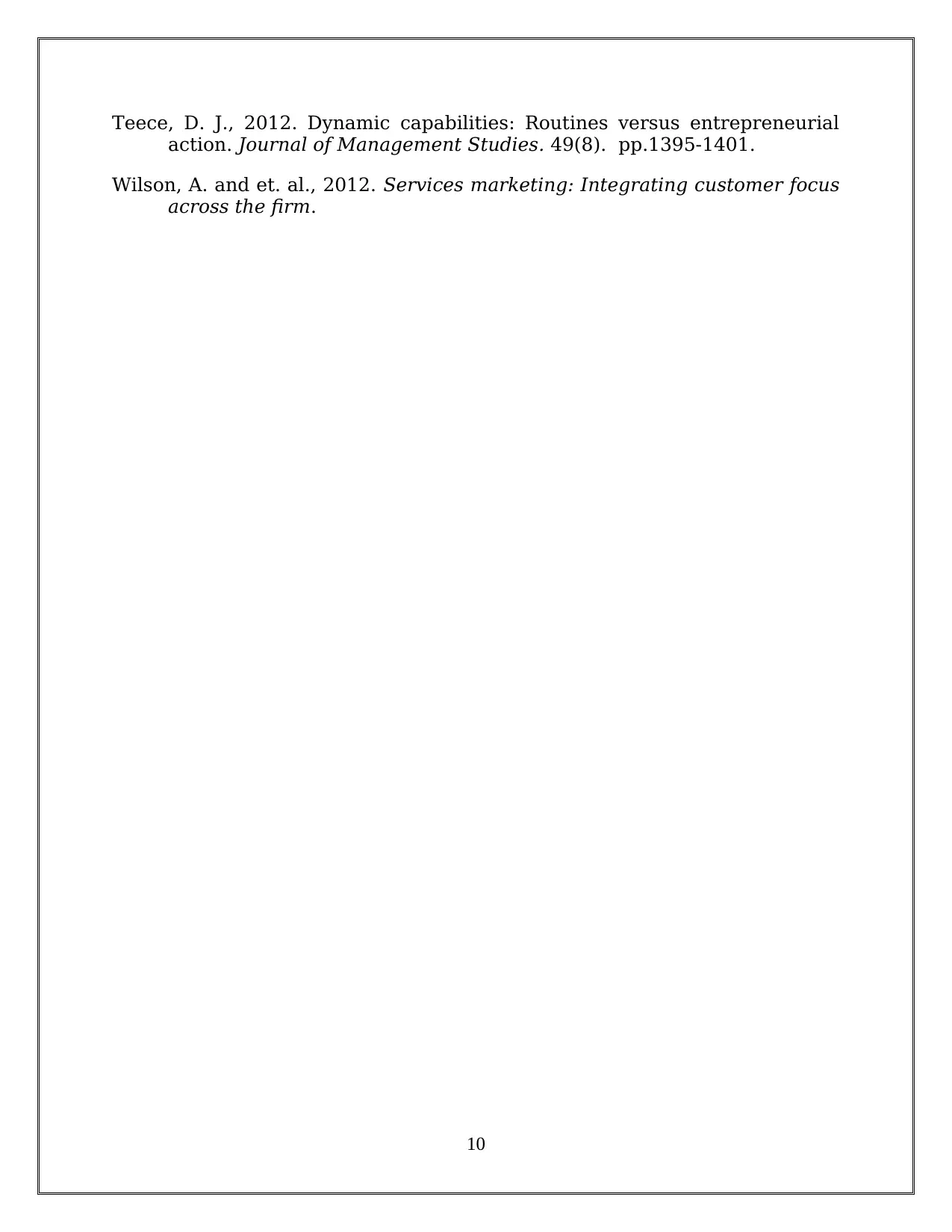
Teece, D. J., 2012. Dynamic capabilities: Routines versus entrepreneurial
action. Journal of Management Studies. 49(8). pp.1395-1401.
Wilson, A. and et. al., 2012. Services marketing: Integrating customer focus
across the firm.
10
action. Journal of Management Studies. 49(8). pp.1395-1401.
Wilson, A. and et. al., 2012. Services marketing: Integrating customer focus
across the firm.
10
⊘ This is a preview!⊘
Do you want full access?
Subscribe today to unlock all pages.

Trusted by 1+ million students worldwide
1 out of 12
Related Documents
Your All-in-One AI-Powered Toolkit for Academic Success.
+13062052269
info@desklib.com
Available 24*7 on WhatsApp / Email
![[object Object]](/_next/static/media/star-bottom.7253800d.svg)
Unlock your academic potential
Copyright © 2020–2026 A2Z Services. All Rights Reserved. Developed and managed by ZUCOL.




